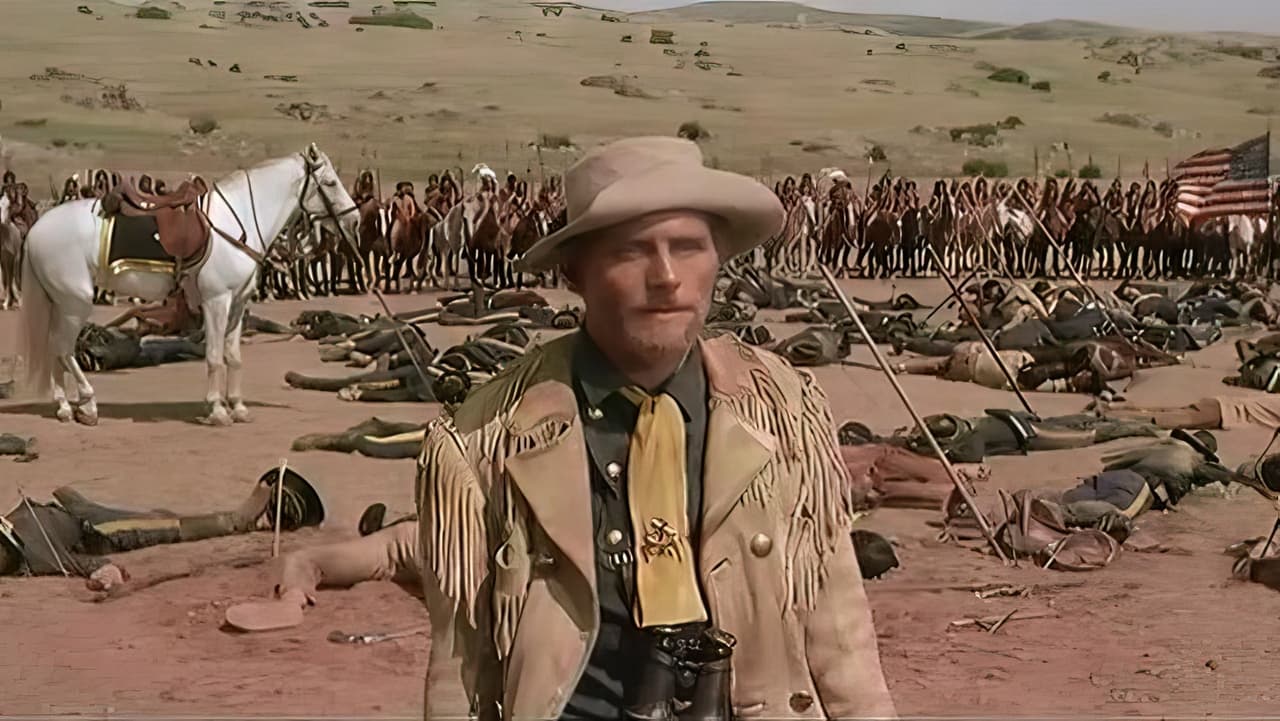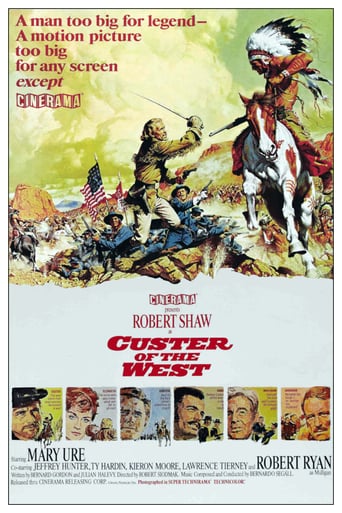ada
the leading man is my tpye
StunnaKrypto
Self-important, over-dramatic, uninspired.
Gutsycurene
Fanciful, disturbing, and wildly original, it announces the arrival of a fresh, bold voice in American cinema.
Helllins
It is both painfully honest and laugh-out-loud funny at the same time.
robert-neil-kelly
I've heard people complain of the historical inaccuracies of this film based on Custer's field position at the Little Big Horn.Stylizing history is not revising it. This film sequences real events in a stylized way, and emotionally depicts the events of Custer's short life.I refuse to accept the charge of historical revisionism from those who accept all out lies in so many other "based on a true story" films on the basis that the film shows no real bloody mutilations.Custer was about thirty-six, married, and brutally honest. Honest men always make enemies - those enemies may have been responsible for his early demise more so than any Cheyenne, by withdrawing from combat and leaving him isolated at Little Big Horn.This movie captures those events and, I believe, helps the viewer develop sympathy for all the characters, including poor Libby, his wife.
bard-32
This is the first time, the VERY FIRST TIME, I've ever, EVER, given a movie I've reviewed here a 1. Hopefully, it won't be the last. But this movie, this abomination of politically correct claptrap, won't be remade any time soon. Custer of the West tells the highly fictionalized story of Lt. Col., Brvt. Maj, Gen. George Armstrong Custer, (Robert Shaw,) who comes to the conclusion that our treaties with the Indians are a sham. Nobody cared how we treated the Indians in the 19th century. By 1876, the era of Lewis and Clark was long over, and the attitude of the American people had changed. They wanted the Indians off their land. (Funny, because the Indians, the Sioux, and Northern Cheyenne, thought that the land was theirs, and that we were the intruders.) Maybe we were, Land, religion, and a clash of cultures, have always fueled, or caused, wars. The movie was the worst movie I'd ever seen, and I saw it back in 1974.
keesha45
While other commentators in this forum have found fault with the historicity of the film, including this quote from Gen. Sheridan, and the failure of the producers to faithfully envision the Montana setting with its Spanish locations, those would have been issues overlooked had the picture been better made and the hero better cast. Robert Shaw was a fine actor and he rose above this to make some really good movies (JAWS, THE STING) but he never seemed to catch the essential charm that Ronald Reagan and Errol Flynn brought to his characterization thirty years before. I'm not especially disappointed when Hollywood twists history to tell a great story as long as it's filled with action, well acted and artfully staged. But there was so much about this film that fell flat. Some action sequences were pretty good, like the log flume flight by the soldier, the railroad car's attack by Indians and subsequent fate after being uncoupled, the town being razed, the miners in the runaway wagon. These were well done and suspenseful and some I've never seen before in quite the way they were done. Unfortunately, the rest of the film doesn't make up for these best parts. The romantic scenes are a poor imitation of those done by Errol and Olivia in THEY DIED WITH THEIR BOOTS ON and the climactic battle is almost boring compared to the one with Flynn. Akira Kurosawa was approached about making this picture and he could have done better certainly. But with the actors he would have had and with the production budget with which he'd been hamstrung, it might have been one of the worst pictures of his career. He was wise to turn away from it. Unless you're a western aficionado like yours truly, you'd be wise to follow suit. Dale Roloff
tarmcgator
I have not seen all of the Custer movies, but this one is certainly NOT the accurate historical portrait/epic that his story begs for. The chief culprits here are the scriptwriters, who seem to have based their scenario on earlier Custer movies instead of serious historical research. They also had to work in some made-for-Cinerama "thrill" sequences that add nothing to the story and seem to go on forever. Shaw, a pretty credible actor, seems to have realized how farcical this effort was and got into the spirit with a performance that is by turns lackadaisical and hammy. His supporting cast -- notably Lawrence Tierney as Phil Sheridan, Ty Hardin as Marcus Reno, and Jeffrey Hunter as Frederick W. Benteen -- also chew the scenery, and as Custer's wife, Mary Ure is apparently under heavy sedation most of the time. My favorite moment of this idiocy, however, comes at the very end, as the director presents the Battle of Little Big Horn as choreographed by Busby Berkeley (only without the overhead shots). Really, if you're a Custer buff, this is only for laughs.

